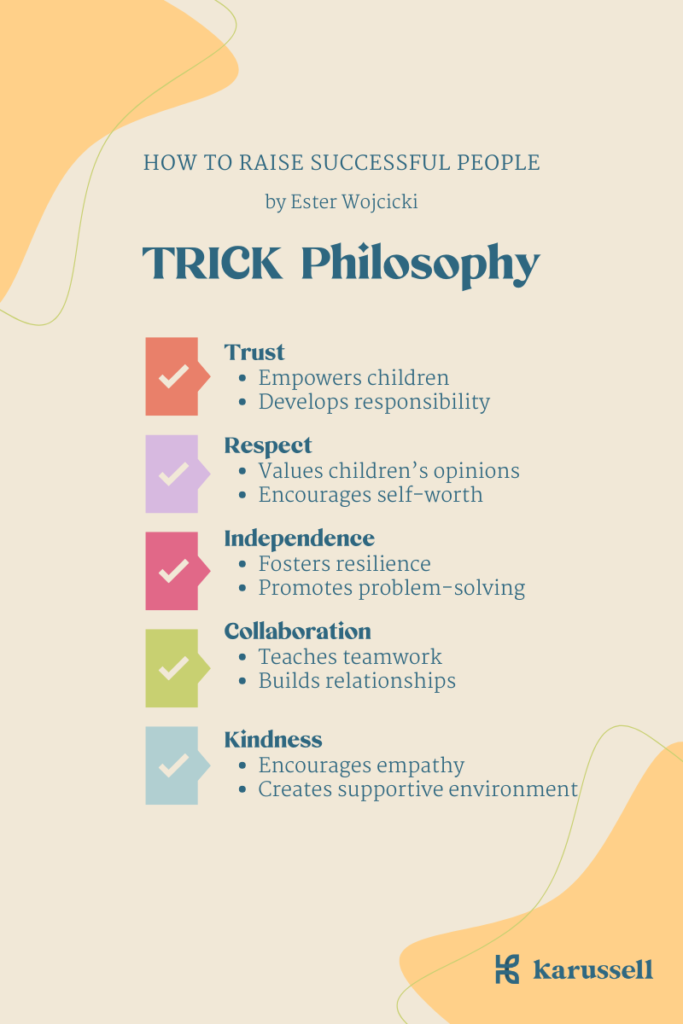
Insights from “How to Raise Successful People” by Esther Wojcicki
Imagine raising three daughters who each become leaders in their respective fields. The ‘Godmother of Silicon Valley,’ Esther Wojcicki, certainly pulled this off, and her book, “How to Raise Successful People,” reveals the principles she used to achieve this. This perceptive guide is mandatory reading for parents, teachers, and everyone involved in the upbringing of children. Wojcicki, a renowned journalist and educator, draws on her extensive experience and personal success in raising three accomplished daughters to present her tried-and-tested approach to parenting.
Unlike typical parenting books focusing on routines like eating or sleeping, Wojcicki’s book emphasises building confidence by raising independent thinkers and problem solvers who will innovate and thrive. The heart of her method is encapsulated in the acronym TRICK, which stands for Trust, Respect, Independence, Collaboration, and Kindness. These principles provide valuable insights and practical advice for building confidence in children, making them confident, capable, and successful.
TRICK Philosophy
Wojcicki begins with the cornerstone of her philosophy: Trust. Trust is the foundation of any healthy relationship, including those between parents and children. By trusting children, parents convey their belief in their capabilities, building confidence and a sense of responsibility. Trusting children means giving them the freedom to make decisions, take risks, and learn from their mistakes. Wojcicki emphasises that trust is not blind but informed and guided. Parents should provide the necessary support and guidance while allowing their children the space to grow and develop independently.

Practical applications of Trust:
- Assigning chores: Give children age-appropriate responsibilities, such as setting the table, feeding pets, or tidying their rooms. This helps them understand their role in the household and builds their confidence.
- Involving children in family decisions: Include children in discussions about family plans, such as vacations or weekend activities. This shows that their opinions are valued and helps them learn decision-making skills.
Building on trust, Wojcicki highlights the importance of Respect…
According to Wojcicki, respect is crucial in nurturing a child’s self-esteem and individuality. Respecting children involves listening to their opinions, valuing their feelings, and treating them as equals. It means acknowledging their autonomy and supporting their decisions, even if they differ from parental expectations. Respect fosters a sense of worth and encourages children to respect others in turn. This mutual respect strengthens the parent-child relationship and creates a positive environment for growth and learning.

Practical applications of Respect:
- Active listening: Listen attentively when your child talks about their day or shares their thoughts. Show interest and respond thoughtfully to demonstrate that you respect their feelings and perspectives.
- Open communication: Encourage open and honest communication by creating a safe space where your child feels comfortable expressing their emotions without fear of judgment or punishment.
With trust and respect as the foundation, Wojcicki emphasises the importance of Independence…
Independence is another key component in building confidence in Wojcicki’s TRICK philosophy. She advocates for giving children the freedom to explore, make choices, and solve problems on their own. Independence fosters resilience, creativity, and critical thinking. Wojcicki suggests that parents should encourage their children to take on responsibilities and handle challenges independently. This approach prepares children for the real world, where they will need to navigate complex situations and make decisions without constant guidance. By promoting independence, parents help their children develop the skills and build the confidence necessary for success.

Practical applications of Independence:
- Choice in hobbies and activities: Allow children to choose their extracurricular activities, whether it’s a sport, musical instrument, or art class. This helps them explore their interests and develop a sense of autonomy.
- Problem-solving opportunities: When faced with a challenge, guide your child through finding a solution rather than solving it for them. This encourages critical thinking and builds confidence and independence.
In addition to independence, Collaboration is essential…
Collaboration is essential in teaching children the value of teamwork and cooperation. Wojcicki emphasises the importance of creating an environment where children can work together with their peers, share ideas, and learn from one another. Collaboration not only enhances social skills but also fosters a sense of community and belonging. Wojcicki encourages parents and educators to create opportunities for collaborative learning and projects at home and in school. By working together, children learn to appreciate diverse perspectives, develop empathy, and build strong interpersonal relationships.

Practical applications of Collaboration:
- Family projects: Engage in projects that require teamwork, such as building a garden, creating a family scrapbook, or planning a family event. These activities teach cooperation and the importance of working together.
- Group learning: Encourage your child to participate in group projects or study groups at school. This helps them learn to collaborate with peers, share ideas, and appreciate diverse perspectives.
Finally, Wojcicki underscores the significance of Kindness…
The final element of Wojcicki’s TRICK philosophy is Kindness. She believes that kindness is fundamental to building a compassionate and just society. Teaching children to be kind involves modelling empathetic behaviour, encouraging acts of generosity, and promoting an understanding of others’ feelings and needs. Wojcicki argues that kindness should be integrated into everyday interactions and decision-making processes. By cultivating kindness, parents can help their children develop strong moral values and a sense of social responsibility. This, in turn, contributes to their overall success and well-being.

Practical applications of Kindness:
- Modelling compassion: Demonstrate kindness through your actions, such as helping a neighbour, volunteering, or showing empathy towards others. Children learn by observing and imitating their parents’ behaviour.
- Community service: Encourage your child to participate in community service activities, such as volunteering at a local food bank, participating in neighbourhood clean-up events, or helping out at an animal shelter. This fosters a sense of social responsibility and empathy for others.
Additional considerations for confidence and independence-building
Creating a supportive environment
Wojcicki stresses the importance of creating a supportive home environment where children feel safe to explore, take risks, and make mistakes. This involves providing emotional support, encouraging curiosity, and allowing children to pursue their interests. A supportive environment nurtures children’s intrinsic motivation and helps them develop a love for learning.
Education Beyond academics
Wojcicki argues that true education extends beyond traditional academics to include life skills and emotional intelligence. She advocates for a holistic approach to education that encompasses critical thinking, creativity, communication, and collaboration. This well-rounded education prepares children for success in various aspects of life.
Hands-off parenting
One of Wojcicki’s key recommendations is to adopt a hands-off parenting style. This involves giving children the space to solve their problems, make decisions, and learn from their experiences. By stepping back, parents can foster independence and critical thinking in their children.
Encouraging creativity
Creativity and innovation are essential skills for future success. Wojcicki discusses ways to nurture creativity in children, such as encouraging them to explore their interests, providing opportunities for creative expression, and allowing them to experiment and take risks. Fostering creativity helps children develop problem-solving skills and adaptability.
Growth mindset
Teaching children to embrace a growth mindset is crucial for their long-term success. Wojcicki emphasises the importance of helping children view challenges as opportunities for growth and learning. By fostering a growth mindset, parents can instil resilience and a positive attitude towards failure.
Effective communication
Open and honest communication is fundamental to building a strong parent-child relationship. Wojcicki highlights the need for respectful and transparent communication, where parents listen to their children’s perspectives and engage in meaningful dialogues. Effective communication builds trust and understanding.
Building resilience
Resilience is a key trait for overcoming life’s challenges. Wojcicki encourages parents to allow their children to face difficulties and learn from them. By experiencing and overcoming setbacks, children develop resilience, perseverance, and a strong character.
Leading by example
Parents play a crucial role as role models for their children. Wojcicki emphasises the importance of leading by example and demonstrating the values and behaviours they wish to instill in their children. Actions speak louder than words, and children learn by observing their parents.

Profiles of Esther Wojcicki’s daughters
Esther Wojcicki’s TRICK philosophy has influenced her daughters, each of whom has achieved remarkable success.
- Susan Wojcicki: Is the former CEO of YouTube (2014–2023). Susan played a pivotal role in Google’s development, particularly with Google AdSense. Significant growth and her support for diversity and inclusion have been hallmarks of her leadership at YouTube.
- Janet Wojcicki: Is a professor of paediatrics and epidemiology at UCSF. Janet’s research in paediatric health, nutrition, and obesity prevention has significantly impacted public health. She is also a dedicated educator and mentor.
- Anne Wojcicki: Is the Co-founder and CEO of 23andMe. Anne’s company has revolutionised the biotech industry with direct-to-consumer genetic testing. She is a strong advocate for ethical standards in genetic research, focusing on consumer privacy and data security.
These profiles highlight the common traits and factors contributing to their success:
- Strong educational foundations: The sisters attended prestigious universities and pursued advanced degrees.
- Supportive upbringing: Emphasising trust, respect, independence, collaboration, and kindness.
- Vision and innovation: Demonstrated visionary thinking and innovation.
- Leadership and determination: Commitment to excellence and leadership qualities.
- Contribution to society: Made significant contributions through technology, public health, and research.
“How to Raise Successful People” is an invaluable resource for parents, educators, and anyone dedicated to the holistic development of children. Wojcicki’s TRICK philosophy—Trust, Respect, Independence, Collaboration, and Kindness—provides a comprehensive framework for nurturing confident, capable, and compassionate individuals. This methodology emphasises fostering children’s passions, encouraging engagement, and empowering them to live lives they genuinely own, rather than lives predetermined by their parents.
By embracing these principles, parents can create a supportive and empowering environment that cultivates their children’s success and well-being. Wojcicki’s insights and practical advice make this book an essential guide for anyone committed to nurturing the next generation of successful individuals. It’s an excellent resource for building confidence and self-esteem in children, ensuring they grow into resilient and fulfilled adults.



